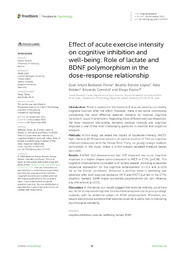Título :
Effect of acute exercise intensity on cognitive inhibition and well-being: Role of lactate and BDNF polymorphism in the dose-response relationship |
Autor :
Ballester Ferrer, Juan Arturo
Bonete López, Beatriz
Roldan, Alba
Cervelló, Eduardo
Pastor, Diego |
Editor :
Frontiers Media |
Departamento:
Departamentos de la UMH::Ciencias del Deporte |
Fecha de publicación:
2022 |
URI :
https://hdl.handle.net/11000/37963 |
Resumen :
Introduction: There is evidence in the literature that acute exercise can modify cognitive function after the effort. However, there is still some controversy concerning the most effective exercise modality to improve cognitive function in acute interventions. Regarding these different exercise modalities, the dose–response relationship between exercise intensity and cognitive response is one of the most challenging questions in exercise and cognition research.
Methods: In this study, we tested the impact of moderate-intensity (MICT), high-intensity (HIIT) exercise sessions, or control situation (CTRL) on cognitive inhibition (measured with the Stroop Test). Thirty-six young college students participated in this study, where a within-subject repeated measure design was used.
Results: ANOVA 2×3 demonstrated that HIIT improved the acute cognitive response to a higher degree when compared to MICT or CTRL (p < 0.05). The cognitive improvements correlated with lactate release, providing a plausible molecular explanation for the cognitive enhancement (r < −0.2 and p < 0.05 for all the Stroop conditions). Moreover, a positive trend in wellbeing was observed after both exercise protocols (HIIT and MICT) but not in the CTRL situation. Genetic BDNF single nucleotide polymorphism did not influence any interactions (p < 0.05).
Discussion: In this sense, our results suggest that exercise intensity could be a key factor in improved cognitive function following exercise in young college students, with no additional impact of BDNF polymorphism. Moreover, our results also provide evidence that exercise could be a useful tool in improving psychological wellbeing.
|
Palabras clave/Materias:
Cognitive inhibition
Exercise
Wellbeing
Lactate
BDNF |
Área de conocimiento :
CDU: Bellas artes: Diversiones. Espectáculos. Cine. Teatro. Danza. Juegos.Deportes |
Tipo de documento :
info:eu-repo/semantics/article |
Derechos de acceso:
info:eu-repo/semantics/openAccess
Attribution-NonCommercial-NoDerivatives 4.0 Internacional |
DOI :
https://doi.org/10.3389/fpsyg.2022.1057475 |
Publicado en:
Frontiers in Psychology |
Aparece en las colecciones:
Artículos Ciencias del Deporte
|
 La licencia se describe como: Atribución-NonComercial-NoDerivada 4.0 Internacional.
La licencia se describe como: Atribución-NonComercial-NoDerivada 4.0 Internacional.
.png)
